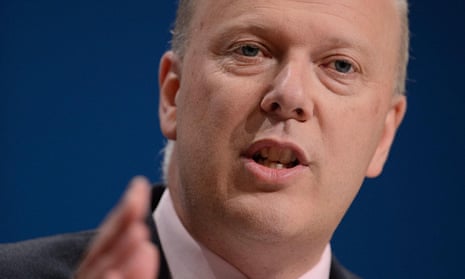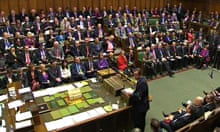Peers have been urged to reject restrictions on judicial review that will make it harder to challenge government and local authority decisions.
The criminal justice and courts bill, which lawyers claim will have a “chilling effect” on those seeking justice, goes before the House of Lords this week.
In a combined statement, the three main legal professions in England and Wales also condemned Ministry of Justice plans to prevent charities and NGOs from intervening in matters of public interest.
The Bar Council, which represents barristers, the Law Society, representing solicitors, and the Chartered Institute of Legal Executives (CILEx) in England and Wales are all opposed to the changes.
The plans are aimed at preventing what are described as unnecessary delays. David Cameron, originally blamed judicial review claims for postponing commercial planning developments.
The justice secretary, Chris Grayling, has said “leftwing” campaigners have exploited the process of judicial review to frustrate government initiatives and to generate a “lucrative industry” for lawyers.
Although the MoJ has already given some ground in the face of opposition, part 4 of the criminal justice and courts bill would, according to critics: restrict judicial review to the wealthy by limiting protective costs orders; render charities and other interveners liable for costs; and effectively “shield public bodies from proper scrutiny when they act unlawfully”.
The key clauses of the bill are likely to go before the House of Lords either on Wednesday or next Monday. The language of the bill may be impenetrable and legalistic but its effect could be far-reaching.
Last week parliament’s joint committee on human rights was highly critical of the proposed changes, warning: “Restricting the availability of cost-capping orders … would be a disincentive to meritorious public interest challenges being brought.”
The surge in judicial review cases over the past decade has not, in fact, been due to planning objections but to an increase in asylum and immigration cases.
In the joint statement, the chairman of the Bar Council, Nicholas Lavender QC, said: “If a government department or local authority did something you thought was unlawful, like stop your business from trading, close your mother’s care home or relocate your child’s school, what would you do?
“Judicial review is an important tool to stop dodgy decision making by public authorities. It is fundamental to our system of justice and the rule of law that members of the public, including the weakest and most vulnerable, have an effective means of scrutinising and checking executive power.”
Andrew Caplen, the president of the Law Society, said: “This would make it easier for public bodies to act without regard for the law in some of the most sensitive areas of our lives.”
Frances Edwards, the president of CILEx, said: “This means judicial review will only be available to risk takers with deep pockets. Access to justice should be about the merits of your case, not the size of your wallet.
“The bill would also allow a government minister to decide what matters are in the ‘public interest’, rather than independent judges. This would enable future governments to keep certain challengers at arm’s length. That is like letting the title holder choose their challenger.”
The shadow justice minister, Andy Slaughter, has also been critical of the government’s plans. “Judicial review is an important constitutional method in which the individual can hold the powerful state to account,” he said. “The public would take a very dim view if any politician sought to undermine that fundamental principle for their own narrow political advantage. Chris Grayling should heed this warning and reverse his plans to curtail judicial review before it is too late.”
Andrea Coomber, director of the civil liberties organisation Justice said: “Judicial review is one of the very few means we can challenge public bodies and Government departments which act unlawfully. We should all be watchdogs when the Government tries to rewrite the rules in its favour.
“Pressing ahead with these changes will shield Government – big and small – from scrutiny, will deprive individuals without means of an often much-needed remedy and will undermine the rule of law. MPs and Peers must act now. The ballot box should not be the only realistic remedy for unlawful public action.”
Responding to criticism, the justice minister, Shailesh Vara, said: “We have seen a huge surge in judicial review cases in recent years. Many judicial reviews are weak or ill-founded and can be expensive and unnecessarily time-consuming.
“We want to make sure judicial review continues its crucial role in holding authorities and others to account, but also that it is used for the right reasons and is not abused by people to cause delays or to generate publicity for themselves or their organisations at the expense of ordinary taxpayers.”










Comments (…)
Sign in or create your Guardian account to join the discussion